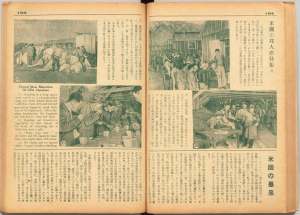From 大東亜戦争記録画報, 英文大阪毎日学習号編輯局 編, June, 1943, pp. 164-165.
Monthly Archives: September 2015
Translations of the Book of Common Prayer
Beginning in 1999, I have worked on digitizing the Book of Common Prayer in languages other than English. This is a current list of languages. Links are available at this address.
- Addo
- Afrikaans
- Ainu
- Amharic
- Angas
- Aoba
- Arabic
- Arapaho
- Armenian
- Armeno-Turkish
- Arosi
- Ateso
- Awabakal Dialect
- Aymara
- Bandi
- Bangala
- Basque
- Beaver
- Bemba
- Binandere
- Bislama
- Bohemian
- Bontok Igorot
- Bugotu
- Bukar
- Bullom So
- Burmese
- Car Nicobarese
- Cheke Holo
- Cherokee
- Cheyenne
- Chichewa
- Chinese
- Chinsenga
- Chinyanja
- Chipewyan
- Chiswina
- Cigogo
- Cornish
- Cree
- Czech
- Dakota
- Deg Xinag
- Dholuo
- Dinka
- Eastern Canadian Inuktitut (Eastern Arctic Eskimo)
- English
- Eskimo
- Eskimo (Point Hope Dialect)
- Fijian
- Florida Language
- French
- Georgian
- German
- Giatikshan
- Grebo
- Greek
- Gujarati
- Gwich’in
- Haida
- Hangchow Colloquial Chinese
- Hausa
- Hawai’ian
- Hebrew
- Hindi
- “Hindoostanee”
- Hungarian
- Iban
- Icelandic
- Igbo
- Italian
- Japanese
- Jawi
- Jinghpaw (Kachin)
- Kamba
- Karamojong
- Karen
- Khmer
- Kigiryama
- Kikuyu
- Kirundi
- Kisi
- Korean
- Kreyol
- Kurdish
- Kwagūtl
- Kwanyama
- Kwara’ae
- Ladino
- Latin
- Lau
- Lavukaleve
- Lombaha
- Longu
- Luganda
- Luhya
- Maasai (Samburu)
- Maewo
- Maisin
- Malagasy
- Malay
- Malayalam
- Manx
- Marathi
- Masaba
- Merelava
- Miriam
- Mohawk
- Mota
- Mpoto
- Mundari
- Munsee/Delaware
- Nahuatl
- Nandi
- Naskapi
- Nduindui
- Neklakapamuk
- Nepali
- Nishga
- Norwegian
- Nume
- Nupe
- Ojibwe
- Ontong Java
- Orokaiva (Pereho)
- Ottawa Ojibwe
- Pashto
- Pennsylvania German
- Persian
- Polish
- Portuguese
- Quechua
- Raga
- Russian
- Sa’a
- Samburu
- Samoan
- Santa Ana
- Saulteaux
- Selako
- Serbian
- Sesutho
- Seychellois Creole
- Shekiri
- Shona
- Shoshoni
- Sikaiana
- Sindhi
- Spanish
- Sudanese Arabic
- Swahili
- Swedish
- Tagalog
- Taita
- Tamil
- Taveta
- Telugu
- Thai
- Tibetan
- Tigara
- Tikopia
- Toga
- Tok Pisin
- Tongan
- Tsonga
- Tswana
- Turkish
- Tutchone
- Ubir
- Ukrainian
- Ulawa
- Upper Koyukon
- Urdu
- Urhobo
- Vai
- Vaturanga
- Vietnamese
- Welsh
- Western Eskimo
- Wichí
- Yiddish
- Zande
- Zimshian
- Zulu
Filed under Uncategorized
The Church’s One Foundation in Anacreontic verse
Ἐκκλησίας Ἰησοῦς
Χριστὸς θέμεθλα μοῦνα.
νέαν νιν ἔκτισ᾽ αὐτός,
ὕδωρ λόγον τ᾽ ἐνεγκών
νύμφην γὰρ ἦλθ᾽ ἄνωθεν
ἁγνὴν πλάσων ἑαυτῷ.
τὸ δ᾽αἷμ᾽ ἔδωκε λύτρον,
αὐτῆς δ᾽ ἕκατι θνήσκει.
ἐθνῶν μὲν ἐξ ἁπάντων,
ἐν γῇ δ᾽ ὅλῃ μί᾽ οὖσα.
σωτηρίας δὲ τέκμαρ,
πίστις μί᾽, εἷς ὁ φύσας,
ἓν κὤνομ᾽ εὐλογητόν.
ἓν βρῶμα πᾶσιν ἁγνόν.
μί᾽ ἐλπίς, ἣν διώκει
πᾶσαν χάριν δυθεῖσα.
εἰ᾽δ᾽ὅμμ᾽ ὕπερφρον ἀνδρῶν
πατουμένην σκοπεῖ νιν,
καὶ σχίσμασιν ῥαγεῖσαν,
δι᾽ αἱρέσεις τ᾽ ἄθυμον.
ὅμως ἀεὶ φυλάσσει,
βοᾷ δ᾽ ” Ἕως ποθ᾽” ὕψι.
ἁγνοῖς δὲ νὺξ ὀδυρμῶν
ἦμαρ χαρᾶς τάχ᾽ ἔσται.
ἀλλ᾽ ἐν μέσῳ κλυδῶνι
πόνων πικρᾶς τε λύπης,
χάριν καραδοκοῦσα
τελεσφόρον προκόπτει.
ἕως ἄνωθεν ὄλβου
βάρος περισσὸν ὀφθῇ.
νίκην τε κανάπαυλαν
Ἐκκλησία φέρηται.
πλὴν καπὶ γῆς ξύνεστι,
Τριὰς μέν, Εἷς Θεὸς δέ,
καὶ τῶν πόνου λυθέντων
κοινωνία γλυκεῖα.
Τρὶς ὄλβιοί τε χαγνοί!
δὃς ταὐτά, Κυρι᾽, ἡμῖν!
πραεῖς τε καὶ ταπεινοί,
Σοὶ ξυμβιῶμεν ὕψι!
—Augustus Montagu Toplady, translated by Allen William Chatfield, Hymnos Nonnullos Recentiorum Auctorum, Variis Metris (Oxford, 1886), pp. 72-75.
Filed under Uncategorized
Lead, Kindly Light in Greek Anapestic Dimeter
Ἡγοῦ μοι φῶς, ἡγοῦ φίλιον.
δεινή με πέριξ ἀχλὺς κέχυται,
νὺξ δ᾽ἕκας οἴκου μ᾽ἔφθη σκοτόεσσ᾽.
ἀλλὰ προηγοῦ.
τὴν βάσιν ὄρθου. τὰ πρόσω προϊδεῖν
οὐκ αἰτοῦμαι. τὸ γὰρ ἐγγὺς ἅλις.
τοιόσδ᾽οὔκ ἦν συνεχῶς, οὐδ᾽αὖ
Σοῦ γ᾽ἐδεήθην ἡγεμονεύειν.
οἶμον ἑλέσθαι καὶ ἰδεῖν ἐφίλοθν.
νῦν δὲ προηγοῦ.
φρέν ἔτερψαν ἐμὴν ἤματος αύγαί.
χύβρις ἐδέσποσεν ὀκνοῦντά μ᾽ὅμως.
μέμνησο δ᾽ ἐτῶν μηκέτι τῶν πρίν.
πολὺν ὧδε χρόνον χρηστά με ῥέξας
οὐκ ἂν άπείποις μή μ᾽ἔθ᾽ὁδηγεῖν
δι᾽ ἕλος, βῆσσαν διὰ χείμαῤῥον,
καὶ πρῶν ἀν᾽ἄκρον, στυγερὰ νὺξ ἥδ᾽
ἔστ᾽ἂν άπέλθῃ,
λάμψῃ δ᾽ἠώς, ἡδὺ γελώσας
φαίνουσ᾽ὄψεις πάλιν ἀγγελικάς,
ἃς πεφίληκα μὲν ἐκ τοῦ γε πάλαι,
φρούδας δὲ τὸ νῦν πεπόθηκα.
John Henry Newman, translated in Allen William Chatfield, Hymnos Nonnullos Recentiorum Auctorum, Variis Metris (Oxford, 1886), pp. 88-89.
Filed under Uncategorized
Charles Wesley in Greek Anapestic Dimeter
Hark! the Herald Angels Sing.
Κλύετ᾽ ἀγγελικοὶ κελαδοῦσι χοροὶ
κοίρανον ὕμνοις νεογέννητον.
γῇ δ᾽ εἰρήνη μαλακος τ᾽ἔλεος.
Θεὸς ἄνθρωποί τ᾽ οἰκοῦσιν ὁμοῦ.
χαίρετε, χαίρετε, σύμπαντ᾽ ἔθνη.
κηρύξαθ᾽ ἅμα στρατῷ ἀγγελικῷ,
‘Χριστὸς γέγονεν πόλει ἐν Δαβίδ.’
Κλύετ᾽ ἀγγελικοὶ κελαδοῦσι χοροὶ
κοίρανον ὕμνοις νεογέννητον.
ἀρχῶν Χριστὸς σέβας οὐρανίων,
εἰς αἰῶνας δ᾽ἐξ αἰώνων.
Κύριος, ἥκει τοῖσδ᾽ ὀψὲ χρόνοις,
παρθένου ἁγνῆς ἄμβροτος υἱός.
βλέψατε κρυφθέντ᾽ ἐν σαρκὶ Θεόν.
Θεότης ἐνέδυ φύσιν ἀνθρώπου.
βροτὸς ὥς, Βροτέαν εἴλετ᾽ Ἰησοῦς
μορφήν,’ Ὁ Θεὸς’᾽ δ᾽’ Ἐστὶ Μεθ᾽ Ἡημῶν.’
Κλύετ᾽ ἀγγελικοὶ κελαδοῦσι χοροὶ
κοίρανον ὕμνοις νεογέννητον.
ὁ Δικαιοσύνης Ἥλιος ἡμῖν,
ἅμα δἘἰρήνης Βασιλεύς, χαίροι.
φῶς καὶ ζωὴν ξυμπᾶσι φέρει,
πτερύγεσσι φανεὶς παυσιπόνοισιν.
δόξαν ἑαυτοῦ προλιπών, γέγονεν
θνητός, θνητοὺς θανάτου λύσων.
Γῆς δ᾽ἵνα παῖδες πάλιν ὀρθῶνται,
θείας φύσεως μετέχοντες.
Κλύετ᾽ ἀγγελικοὶ κελαδοῦσι χοροὶ
κοίρανον ὕμνοις νεογέννητον.
Charles Wesley, translated in Allen William Chatfield, Hymnos Nonnullos Recentiorum Auctorum, Variis Metris (Oxford, 1886), pp. 122-125.
Filed under Uncategorized
Altering the Altar
Directives to the clergy,
In the Book of Common Prayer,
Command them to officiate,
But fail to tell them where.
An old and hoary question,
At the Supper of the Lord,
Is what position to adopt
When standing at the Board.
For some prefer to face the East,
Their back turned to the church,
While others at the Northern end
Precariously perch.
This controversial argument
Was carried on with zest,
Until, at last, the liturgists
Decreed to face the West.
So, in our newly-fashioned church,
This problem we’ll escape,
Because the altar we’ve designed
Is circular in shape.
Though West is West, and East is East,
Within our kindly fane,
We think we’ve found a clever way
To reunite the twain.
And, in these times of compromise,
It seems to us the best,
To cater for the Nor-Nor-East,
And even Sou-Sou-West.
From S. J. Forrest, Chapter and Verse (London: Mowbray, 1959), pp. 14-15.
Filed under Uncategorized
Christmas with the Demythologizers
From E.L. Mascall, Pi in the High (New York: Morehouse-Gorham, 1959), pp. 49-51.
1
Hark, the herald angels sing:
“Bultmann is the latest thing!”
(Or they would if he had not
Demythologized the lot.)
Joyful, all ye nations rise,
Glad to existentialize!
Peace on earth and mercy mild,
God and Science reconciled.
Lo, the ancient myths disperse.
Hence, three-storied universe!
Let three-decker pulpits stay:
Bultmann has a lot to say,
Since Kerygma still survives
When the myths have lost their lives.
Hark, the herald angels sing:
“Bultmann shot us on the wing!”
Dr. Farrer we detect
Somewhat lacking in respect,
Launching, with his puckish arts,
Tiny well-directed darts;
While Herr Luther’s lumpish sons
Overload their massive guns,
Blowing, when the barrel splits,
Bultmann—and themselves—to bits.
Let us with a gladsome mind
Leave the ancient world behind.
Modern man, rejoice with us!
We have read Copernicus.
While the herald angels sing:
“Bultmann ist ein gutes Ding!”
We respond in simple trust:
“Demythologize or bust!”
2
(Air—Good King Wenceslas)
Dr. Bultmann ventured forth
Boldly from his study,
When the wind was in the north,
and the roads were muddy.
All his thoughts were in a maze;
This was not surprising.
He had spent some weary days
Demythologizing.
“Hither, pupil, strain thy sight
If thou canst, descrying
Yonder folk who shove and fight—
What can they be buying?”
“Sir, ’tis cards with scraps of verse,
Pictured with a fable:
Shepherds and astrologers
Kneeling in a stable.”
“Bring my writings, if you please,
in the last editions.
Du und ich we’ll stifle these
Outworn superstitions.”
Sage and pupil forth they go,
Braving every stigma,
Shedding myths like billy-o,
Clinging to kerygma.
“Sir, my thoughts begin to stray
And my faith grows bleaker.
Since I threw my myths away
My kerygma’s weaker.”
“Think on Heidegger, my lad,
That pellucid Teuton;
Then you won’t feel half so bad
When they talk of Newton.”
Existentially he thought,
as his master hinted.
All the learned works he bought
Which the sage had printed.
Therefore, folk, when science sends
Doubts and fears depressing,
Demythologize your friends—
Then you’ll win their blessing.
Filed under Uncategorized



